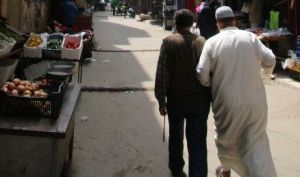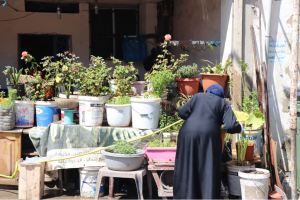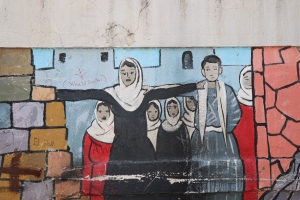How do Christian Iraqi men and women who have sought safety in Turkey conceptualise and narrate their own experiences of displacement and violence, including with regards to processes related to religion? In this review of a collection of stories written by Christian Iraqi refugees, Dr Estella Carpi argues that religion can be instrumentalized within conflict situations in a multiplicity of ways, proposing that post-confessional approaches can help develop a more nuanced understanding of these processes precisely by facilitating “an interpretation of socio-political processes beyond religious belongings” alone.
The Southern Responses to Displacement has been exploring the themes of religion and faith based responses to displacement. To read more on these topics see here, here and here and access the recommended reading at the end of this post.
Pursuing Hope (Umudun Peşinde): A Review
By Dr Estella Carpi, Institute of Risk and Disaster Reduction
Pursuing Hope, published and distributed by the Bible Shop in Istanbul, is a collection of twenty stories written by Christian Iraqi refugees who either passed through Turkey before resettling in third countries, or who are still in Turkey. The volunteers of the Syriac Catholic Church started collecting these stories in 2016, and wanted them to be published. Buğra Poyraz, from the Bible Society, served as editor of this collection. The stories, originally written in Arabic, have been translated into English by Natalie Konutgan, and the book has also been translated into Turkish to enable local people to access the stories of Turkey-based Iraqi refugees.
While people with different religious and ethnic backgrounds in the Middle East have been displaced several times throughout modern history – especially during the formation of the nation-states over the twentieth century – the stories in this book all refer to the 2014 expansion of the Islamic State (IS) in Iraq (e.g., Mosul and Anbar) and the subsequent expulsion and oppression of Christian Iraqis, among other groups (e.g., Yezidis and Muslim Shiites). These stories, written by Iraqi women and men, witness religiously-motivated violence, everyday forms of persecution, chronic uncertainty, and nostalgia about a lost normality. The violence these stories denounce is not only macro-political, but instead encompasses all intimate forms of violence that relate to conflict-related displacement. Notably, the stories range from the resentment felt towards one’s own wife for having decided to accept resettlement in a third country without waiting for her husband to be able to join her, to experiences of house raids, systematic threats, explosions in church during Mass and car-bombs. Some of the stories also trace the ambiguous feelings that revolve around the decision to be smuggled by boat, and the chronic intimate sense of insecurity generated by experiences of kidnapping. Amongst the horror documented in such stories, the normality of “taking walks with family” and “seeing children playing” (p. 56) can only be imagined.
Disease, divorce, and resettlement reshape the destiny of refugee and displaced youth and children, with the latter embodying the only sense of building a future in some of the stories of refugee parents. War and persecution dramatically disrupt parenthood when parents survive their children, or “tear families apart” (p. 131) when the resettlement of children is the only viable option; refugee parents enter an eternal wait to be able to see their children again and, at times, prefer dying where they were born, although the place where they lived has by now turned into “a heap of stones” (p. 125).
In this framework, the church, like mosques during the Ottoman period, becomes a shelter which simultaneously protects and puts people at risk of being targetted by IS militants, as it marks them as “infidel Christians”. However, in this collection of stories, religious belonging only matters in response to religion-defined violence, which explicitly aims to construct Christians as illegitimate inhabitants and “infidels” (p. 23) in the areas conquered by IS during its expansion in 2014. The religious identity of IS militants is never made explicit, precisely because Sunni Islam is not the issue here: the enemies are rather “terrorists” (p. 51), “gang members” (p. 96) and “hate murderers” (p. 18). If these Christian Iraqi refugees used to live their life together with other social and religious groups, the enemy, although located in a broader political economy of war and motivated by various political and economic factors, still call them by name and religious affiliation; still chase them from town to town because they are Christian (p. 71). Abandoning Christianity becomes the only token for physical safety; yet, it does not spare those identified as apostates a harrowing future as a slave of IS fighters and militants.
As noted in the collection, “being Christian” is not an a priori marker defining the lives of these refugees: religious belonging matters as it is made an explicit target of systematic violence. For instance, by being asked their name and religion (p. 57) to justify violence and persecution, and by being threatened because they are Christians. Pursuing Hope is an invitation to reflect on how epistemologies based on post-confessional approaches – by inviting us to an interpretation of socio-political processes beyond religious belongings – can importantly unearth the infinite ways in which religion is instrumentalised. Such approaches are most suitable and, indeed, need to be adopted to guide our understanding of human conflict. Yet, this collection of stories also offers a powerful reminder that post-confessionalism has not fully managed to explain how violence committed in the name of religion still happens, although religion per se complexly relates to politics, economy, and human culture. Indeed, we should make the effort to understand religiously-motivated violence and hatred by being inspired by post-confessional views while also learning about the material instrumentalisation of religion.
In the contemporary Middle East, due to its religious diversity, commentators and rights’ advocates often speak of the need to “protect religious minorities”, such as the Christians of Iraq. As a result, religious minorities have gradually come to constitute a fundamental feature of state politics and a token of eligibility to access to humanitarian services. The nation-state boundary logic, however, has forced these social groups to be merely described in minority terms, while in-group nuances often go unheeded. Similarly, it is the invasive presence of the state in the Middle East — generally an authoritarian entity using divide-and-rule strategies – that has often fomented a longing for secessionism and identity-defined independence in particular religious and/or ethnic groups. As I have argued in the past, the “numberization” of social groups in the Middle East region, often ravaged by conflict, has long served political intentions and fears. And here lies the fallacy of religion meant as an empty category that we can fill with any meaning but which is still capable, however it is interpreted, of shaping events and raising different collective sentiments.
In the framework of numerous and diversified forms of faith-inspired assistance for displaced people worlwide, this book is an important reminder that “religions are always embedded in and linked to the cultural, political, economic, and social environments around them. This means that religious actors can have ties to all aspects of involvement in a conflict, but also as peacemakers”. In the light of this, as the Southern Responses project has shown across the years, refugees who identify themselves as religious are likely to be instrumentalised by international actors, without the former being able to have their say on services and displacement management.
Pursuing Hope will haunt its readers with its heartbreaking stories, and with the need to forward an epistemology that interrogates the instrumentalisation of religion while warning against identity-based stigmatisation.
The book can be purchased in the Bible Shop on Istanbul’s popular İstiklal Caddesi, in other libraries in Turkey, or online.
**
Asai, N. (2019) Soka Gakkai International – Faith-Based Humanitarian Action During Large Scale Disaster
Carpi, E. (2019) Local Faith Actors in Disaster Response and Risk Reduction – ALNAP Webinar
Carpi, E. (2018) Does Faith-Based Aid Provision Always Localise Aid?
Fakih, F. (2019) Beyond Humanitarianism Paradigm: The Effect of Displacement on Religious Authorities – Dr Estella Carpi Lecture at Lebanese American University
Fiddian-Qasmiyeh, E. (2018) Faith-Based Humanitarianism
Fiddian-Qasmiyeh, E. (2017) Refugee-Refugee Humanitarianism
Olliff, L. (2019) Refugee diaspora humanitarianism and the value of North/South distinctions in research on responses to forced displacement.
Omata, N. (2019) South-South Cooperation in International Organizations: Its Conceptualization and Implementation within UNDP and UNHCR
Ozturk, M. (2019) Municipal-level responses to Syrian refugees in Turkey: The case of Bursa
Wagner, A. C. (2019) “There are no missionaries here!” – How a local church took the lead in the refugee response in northern Jordan
Featured image: Creative Commons




Leave a comment